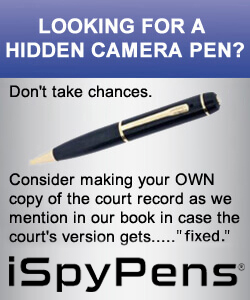How an Investigation Into Possible Spying Turned Into a Child Pornography Prosecution

FBI agents investigating a potential data leak at Boeing obtained a secret warrant to search the home computers of a company manager in California for evidence they hoped would connect him to Chinese economic espionage. Instead, they say, they allegedly found something else entirely: graphic child pornography.
With that discovery more than ten years ago, an investigation that began with sensational but ultimately unproven allegations of espionage veered into an unrelated child pornography prosecution that won Keith Gartenlaub’s conviction. Now, the Los Angeles case is testing a defendant’s ability to access information about himself that had been presented to the nation’s secretive intelligence court, which issued the warrant that let agents scour his computers. At issue is how the government uses evidence derived through the Foreign Intelligence Surveillance Court and under what circumstances that information should be seen by defendants, particularly when it’s repurposed for a routine criminal prosecution that has nothing to do with national security.
Gartenlaub says he has a right to know the government’s arguments that were used to obtain the warrant, and fight them. “You can’t base a search on lies,” he said in an interview with The Associated Press. He’s seeking a new trial after he was sentenced and served time, saying there’s no evidence he was aware of the child pornography or had ever accessed the images. If that’s denied, he’s likely to appeal on grounds that the warrant to inspect his computers was based on false assumptions and allegations of a crime—espionage—for which he’s never been charged.
It won’t be easy. His request to suppress pornography evidence he said was improperly obtained was denied before the trial. He’s tried to review the sealed FISA court records in hopes of attacking the FBI search, but the government refused and a judge said he wasn’t entitled to it.
The FISA court, created in 1978 to hear government surveillance requests in foreign intelligence matters, remains shrouded in secrecy. Judges can theoretically order prosecutors to share FISA information with defendants if they deem it necessary for challenging a search’s legality, but courts have consistently agreed with the government that disclosing the material could expose sensitive intelligence secrets. In Gartenlaub’s case, then-Attorney General Eric Holder advised against disclosure.
A rare exception came in 2014, when a judge in Chicago ordered the disclosure of FISA materials in a bomb-plot case. A federal appeals court overturned the decision, and the Supreme Court declined to review it.
“For defendants, access to this information is a matter of fundamental fairness, because without it they cannot meaningfully challenge whether the government’s secret searches were lawful in the first place,” American Civil Liberties Union lawyer Patrick Toomey said in an email. “For the public, this information is crucial because it is the only way to know whether the law’s basic protections for Americans have been watered down in practice, behind closed doors.”
The Justice Department noted that the judge, Christina Snyder, already ruled that the FISA warrant was lawfully issued and the evidence properly gathered. “When law enforcement lawfully obtains evidence of a serious crime, in this case a crime against children, we will pursue further investigation of that crime,” the department said in a statement.
The FBI interviewed Gartenlaub multiple times in 2013 after a Wired.com article revealed a resemblance between a new Chinese aircraft, the Xian Y-20, and the Boeing C-17, a military cargo plane, and suggested someone within Boeing may have been responsible.
A separate FBI affidavit seeking access to Gartenlaub’s Yahoo email account lays out the basis for suspicion, describing Gartenlaub as the “one engineer” who had access to C-17 data, intimate knowledge of Boeing’s computer systems and family ties to China. His wife is from China with a family he described as “well connected,” and he traveled regularly to the country and expressed frustration that Boeing sought to limit his excursions there over security concerns, the affidavit says.
A recent court filing suggested a connection to the prosecution of Su Bin, a Chinese businessman who pleaded guilty last month for his role in a Boeing hack that led to the theft of C-17 secrets. But Gartenlaub, for his part, maintains he wasn’t working on the C-17 program when the Su Bin theft is thought to have occurred and didn’t have access to the data in the first place—though, he says, thousands of other Boeing employees did. He says the FBI misstated his position at Boeing, making it sound like he had broader access than he actually had.
The FBI accessed his computers early in 2014 after obtaining the FISA warrant and arrested him months later for pornography charges. In its search the FBI says it found videos of prepubescent girls on multiple hard drives, and evidence that Gartenlaub maintained a “carefully curated and organized collection” that was copied multiple times. But Jeff Fischbach, a forensic examiner who reviewed the evidence for the defense, said there was no evidence the videos were ever opened or accessed in the years since they’d been downloaded and placed onto his computer and that other computer users may well have been responsible for the files.
“Either I’m this spy-slash-child pornographer, or I’m one of them, or I’m none of them,” Gartenlaub said. “I’m telling you, I’m none of them.”
The Justice Department's internal watchdog is reviewing a former Boeing engineer's allegations that he was unfairly investigated by the FBI on suspicion that he was spying for China, according to correspondence and court filings reviewed by The Associated Press. It's the latest challenge related to secretive surveillance powers used in some terrorism and espionage cases.
The inspector general review is unfolding amid broader scrutiny of the FBI's process for applying for court-authorized surveillance in national security investigations. Errors in applications submitted during the Russia investigation of Donald Trump's first presidential campaign, as well as in a larger sample of applications subsequently scrutinized by the watchdog office, have spurred bipartisan concerns about government surveillance powers and yielded rare alignment from pro-security and pro-privacy voices in Congress.
At issue in this case is a warrant the FBI obtained in 2014 from the secretive Foreign Intelligence Surveillance Court to search the computers of Keith Gartenlaub as agents investigated whether he had leaked to the Chinese design plans for a C-17 military transport plane. Gartenlaub was never charged with any espionage-related crimes, but the Justice Department did bring child pornography charges after finding images on his hard drive. He was convicted in federal court in California and sentenced to more than three years in prison.
He has long maintained his innocence, insisting that the files were not his, were never opened, and date to a period in his life when numerous people had access to his computer while he lived at a beach house. In any event, he argues, the FBI had no basis to search his computers in the first place since there was no evidence he had conspired with China.
Having now completed his sentence, he sued last year to vacate his conviction and his lifetime probation, alleging that he was victimized by an error-tainted investigation and that there was no basis to suspect him of espionage. As part of the lawsuit, Justice Department lawyers have revealed that the inspector general is reviewing Gartenlaub's complaint, acting on his request that it do so.
In a recent court filing, lawyers said the inspector general anticipated that it would take at least six additional months to finish reviewing the issues that Gartenlaub raised. In addition, an August letter from the inspector general's office to Gartenlaub's lawyer said his allegations were being looked at by the oversight and review division. A separate letter last year to Rep. Ted Lieu, D-Calif., also disclosed a review by the office.
"To me, this is a canary in a coal mine case," said Gartenlaub's lawyer Tor Ekeland. A spokeswoman for the inspector general declined to comment.
Gartenlaub has publicly maintained for at least five years that he was unfairly targeted by the FBI and that the allegations in the original application were mistaken. He has said, for instance, that the FBI misstated his position at Boeing and that he didn't have access to the information that was obtained by the Chinese so he could not have disclosed it.
"It's an entirely different thing to take a national security warrant and then use it to prosecute a domestic, criminal crime," Ekeland said. "Without that FISA search warrant, they have no case. It's not some ancillary thing."
Though Gartenlaub was convicted of unrelated crimes, his underlying allegations about flaws in the FISA process have gained traction over the last year following revelations by the inspector general of seventeen significant errors or omissions in four applications submitted to surveil a former Trump campaign aide during a probe into possible coordination between the 2016 campaign and Russia. The FBI in response issued dozens of corrective actions designed to ensure the accuracy and thoroughness of its FISA applications.
Months later, the inspector general's office revealed that a broader audit of twenty-nine FISA applications had turned up problems in each, including apparent errors or inadequately supported facts. The FBI has said that most of the errors were minor and would not have affected a judge's decision that there was probable cause for the surveillance.
"I'm no Trump fan, but I thank him for this one," Ekeland said. "He shined attention onto this bloated national security apparatus that is unaccountable."



 "The most important book written this century for Americans!"
"The most important book written this century for Americans!"








Comments
If you want to comment as a guest without signing in with social media and without signing up with Disqus:
1 – Enter your comment2 – Click in the Name box and enter the name you want associated with your comment
3 – Click in the Email box and enter your email address
4 – Select "I'd rather post as a guest"
5 – Validate the CAPTCHA and then click the arrow
comments powered by Disqus